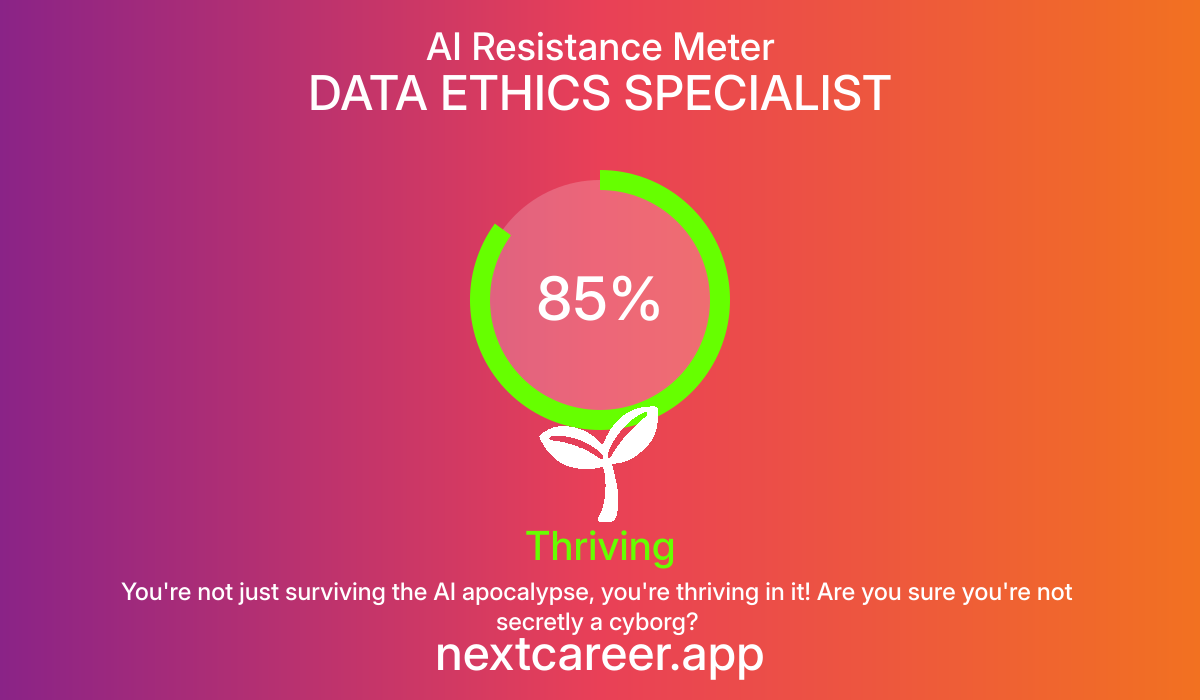AI Resistance Analysis
DATA ETHICS SPECIALIST
DATA ETHICS SPECIALIST
AI Resistance Score
AI Resistance Meter
Thriving
DATA ETHICS SPECIALIST
You're not just surviving the AI apocalypse, you're thriving in it! Are you sure you're not secretly a cyborg?
Data Ethics Specialists are poised to maintain high resistance against AI encroachment due to the complex interplay of ethical considerations, human judgment, and societal values in data utilization. As AI systems advance, these professionals will be needed to navigate nuanced moral landscapes and foster human-centric design, which is challenging for AI to replicate. Their role will evolve with technology, transitioning towards managing AI accountability, bias mitigation, and enhancing regulatory compliance.
Data Ethics Specialists are poised to maintain high resistance against AI encroachment due to the complex interplay of ethical considerations, human judgment, and societal values in data utilization. As AI systems advance, these professionals will be needed to navigate nuanced moral landscapes and foster human-centric design, which is challenging for AI to replicate. Their role will evolve with technology, transitioning towards managing AI accountability, bias mitigation, and enhancing regulatory compliance.
Key Factors
- Cognitive Tasks: Data Ethics Specialists engage in critical thinking, evaluating complex ethical dilemmas related to AI deployment that require nuanced human judgment.
- Emotional Intelligence: They need to effectively communicate ethical standards and engage with diverse stakeholders, requiring high emotional intelligence and empathy.
- Physical Skills: The role does not heavily rely on physical skills, thus AI has minimal impact in this regard.
- Creative Thinking: Generating innovative frameworks for ethical AI applications and foresight in ethical implications requires creativity.
Human Advantages
- Inherent understanding of human values, ethics, and societal implications that guide responsible AI use.
- Ability to address and resolve ethical dilemmas that are contextually sensitive, leveraging emotional intelligence and relationship-building skills.
- Capacity to function as conveners in discussions about technology, law, and morality, which necessitates human empathy and understanding.
AI Vulnerabilities
Recommended Actions
- Enhance knowledge of evolving AI technologies and their ethical implications to stay ahead in the field.
- Foster interdisciplinary collaboration with technologists, legal experts, and sociologists to build comprehensive frameworks.
- Engage in continuous learning and professional development to adapt to changing ethical landscapes and regulatory environments.
- Promote public discourse about ethics in AI to improve societal understanding and support for the role's importance.
In the near term (5 years), demand for Data Ethics Specialists will likely rise as organizations increasingly adopt AI technologies, heightening the need for ethical assessments and compliance with emerging regulations. Long-term (20+ years), these specialists may transition to executive roles (e.g., Chief Ethics Officers) as organizations embed ethics into their strategic planning, highlighting the importance of ethical governance in AI. Future shifts may include global ethical standards that require agile adaptation and understanding from these specialists.

Why Calculate AI Resistance?
Understanding how AI-resistant your career is becoming increasingly important in today's rapidly evolving job market. Our analysis combines multiple factors including required human skills, technological adaptability, and future industry projections to give you a comprehensive view of your career's sustainability.